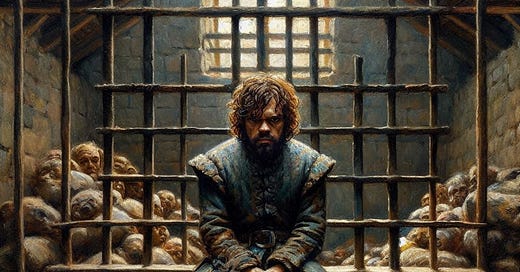The Nature of Evil: Lessons from Game of Thrones and Stoicism
Episode #338
In Game of Thrones, Tyrion Lannister recounts a story to his brother Jaime about their cousin Orson, who spent his days crushing beetles with a rock. The tale is simple, yet it speaks volumes about the complexity of human behavior, the nature of evil, and how we, as individuals, respond to it. Tyrion's contemplation about Orson's actions leads to profound philosophical questions: why do people commit seemingly meaningless acts of destruction? Why do they harm others? The metaphor of crushing beetles becomes a lens through which we examine larger truths about power, suffering, and virtue.
Orson’s Beetles and the Question of Evil
Orson’s obsession with smashing beetles represents a broader, often troubling question: why do people engage in destructive or evil acts? Orson, described as "simple," doesn’t have a clear reason for his actions. When asked, he simply says, "Smash the beetles." This unsettling lack of explanation mirrors the senselessness of many harmful actions in the real world. Tyrion, deeply troubled by Orson’s behavior, imagines endless piles of crushed beetles, symbolizing the countless lives destroyed by cruelty and violence.
The randomness of Orson’s actions reflects a fundamental truth about evil: often, it is senseless, inexplicable, and driven by a complex mix of motivations, or sometimes by none at all. As Tyrion searches for meaning, the audience is left to grapple with the realization that some actions — especially those rooted in power or indifference — have no rational basis.
Power and Exploitation
One interpretation of Orson’s beetle-smashing is that it represents the exercise of power over the powerless. The beetles, insignificant in the grand scheme of things, are subject to Orson’s whims simply because he has the ability to crush them. This dynamic parallels the way some individuals or groups exploit others when they hold unchecked power. The crushing of beetles, then, becomes a metaphor for larger societal issues — how those with power often destroy what they consider insignificant without a second thought.
This theme is prevalent in history, where the powerful have often used their position to harm those beneath them. Orson’s actions, like many evil deeds, stem from a basic human inclination to dominate and control, even when the object of that control is meaningless or small.
The Stoic Response: Choosing Virtue in the Face of Evil
As Tyrion shares his story, he picks up a small bug and lets it crawl across his hand before gently releasing it. This small gesture offers a powerful contrast to Orson’s senseless destruction. Tyrion, despite being imprisoned and facing a potential death sentence for a crime he did not commit, chooses not to crush the bug. In doing so, he embodies a Stoic response to suffering and evil.
Stoicism teaches that while we cannot control the external events of our lives — whether it be injustice, cruelty, or adversity — we *can* control our response. Tyrion’s choice to let the bug live, despite his dire circumstances, symbolizes a commitment to virtue and resilience. Rather than perpetuate suffering by taking his frustration out on something weaker, he chooses to let go of unnecessary harm.
Life as a Prison: The Human Condition
Tyrion’s imprisonment serves as a metaphor for the human condition. In life, we are often bound by circumstances beyond our control. We face inevitable suffering, loss, and ultimately death. Like prisoners, we are constrained by responsibilities, societal expectations, and the limitations of our bodies. Yet, Stoicism reminds us that while we may feel trapped, we are not prisoners unless we choose to view ourselves that way.
Life's trials can feel like a prison, but we always have the power to change our perspective. Stoicism teaches us to accept the things we cannot control and to focus on what is within our power: our choices, our actions, and our attitude. In this sense, even in the face of overwhelming adversity, we are free.
Resisting Evil with Virtue
Tyrion’s story underscores a key Stoic principle: our response to evil defines our character. When we are wronged, the temptation to retaliate or perpetuate further harm can be strong. However, Stoicism advocates for breaking the cycle of harm by choosing virtue over vengeance. Even when others commit evil acts, we must strive to live with justice, courage, wisdom, and temperance.
In the scene, Tyrion faces the same choice Orson did — to crush or to spare. By choosing to spare the bug, he models the strength required to resist the pull of anger and destruction. In a world filled with evil, the Stoic approach is to stand firm in one’s values, refusing to be dragged down by the actions of others.
Conclusion: The Power of Choice in an Uncontrollable World
Orson Lannister’s beetle-smashing may seem like a small, meaningless act, but it opens the door to profound questions about human behavior and the nature of evil. Tyrion’s reflection on this seemingly trivial event provides a powerful insight into how we confront adversity and injustice. Through the lens of Stoicism, we are reminded that while we cannot always understand or stop the evil in the world, we can choose how we respond to it.
In the end, it is our choices — not the actions of others — that define who we are. By living with virtue and resilience, even when faced with cruelty, we assert our freedom and our humanity in a world that often feels chaotic and uncontrollable.
Support the Show
You can expect one free episode of the podcast every single Tuesday. These episodes will either be a 20-minute (or so) solo episode diving deep into a single philosophical topic, or a guest episode, where I bring on incredible guests to chat philosophy.
For the full Strong Stoic experience, I encourage you to consider becoming a paid subscriber. You’ll get access to premium episodes of the Paradoxically Speaking podcast with Joshua Bertolotti, access to my Steps to Success interview series, a bi-weekly exclusive article analyzing a particular quote, and additional benefits from time to time.
***If you’d like to become a paid member but cannot afford it, feel free to contact me directly; I’ll happily provide a complimentary membership (no questions asked).





